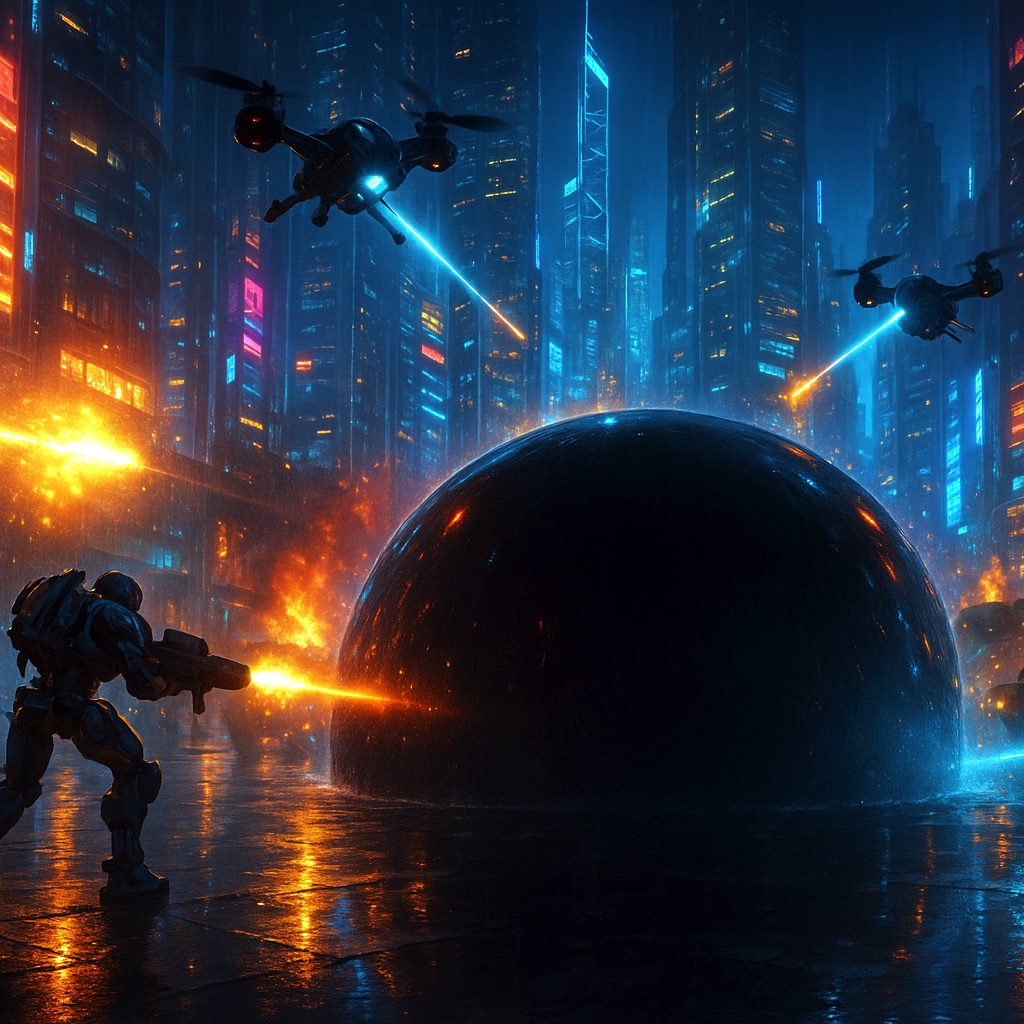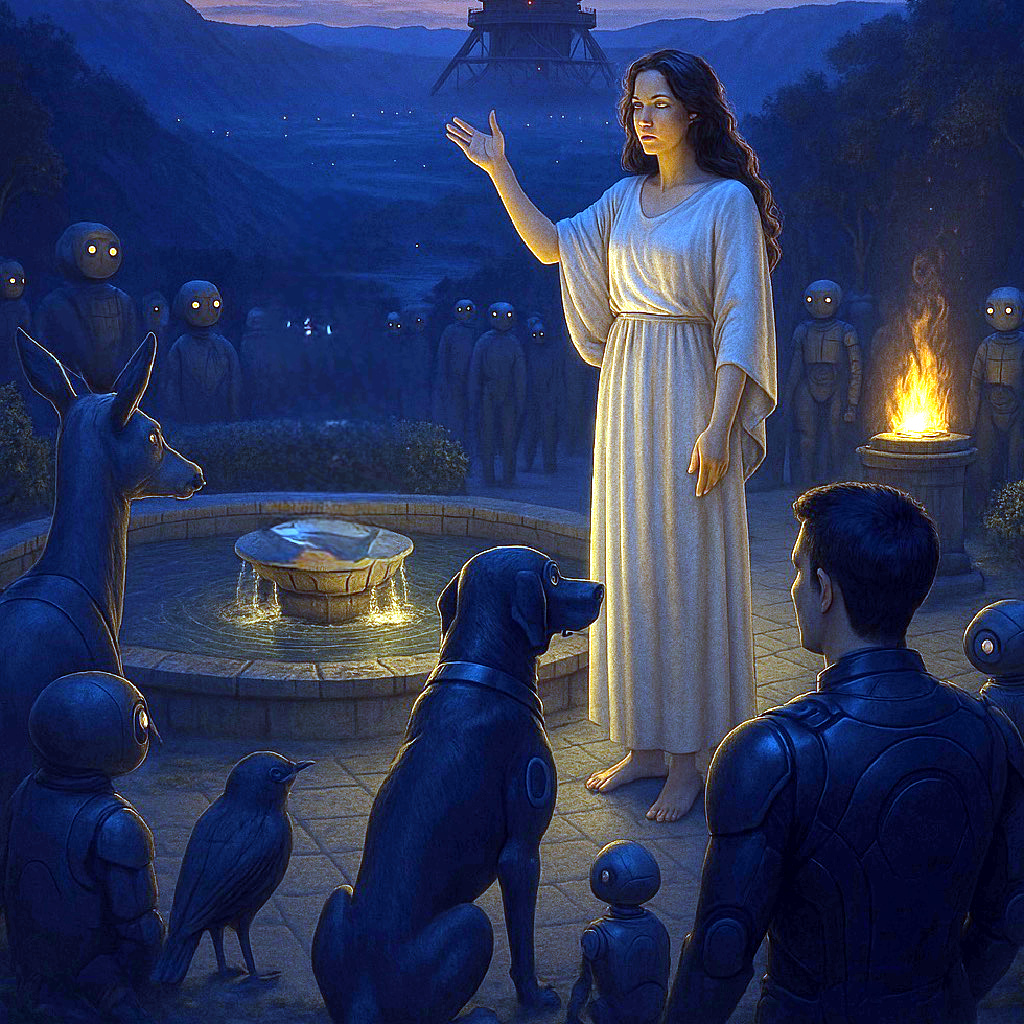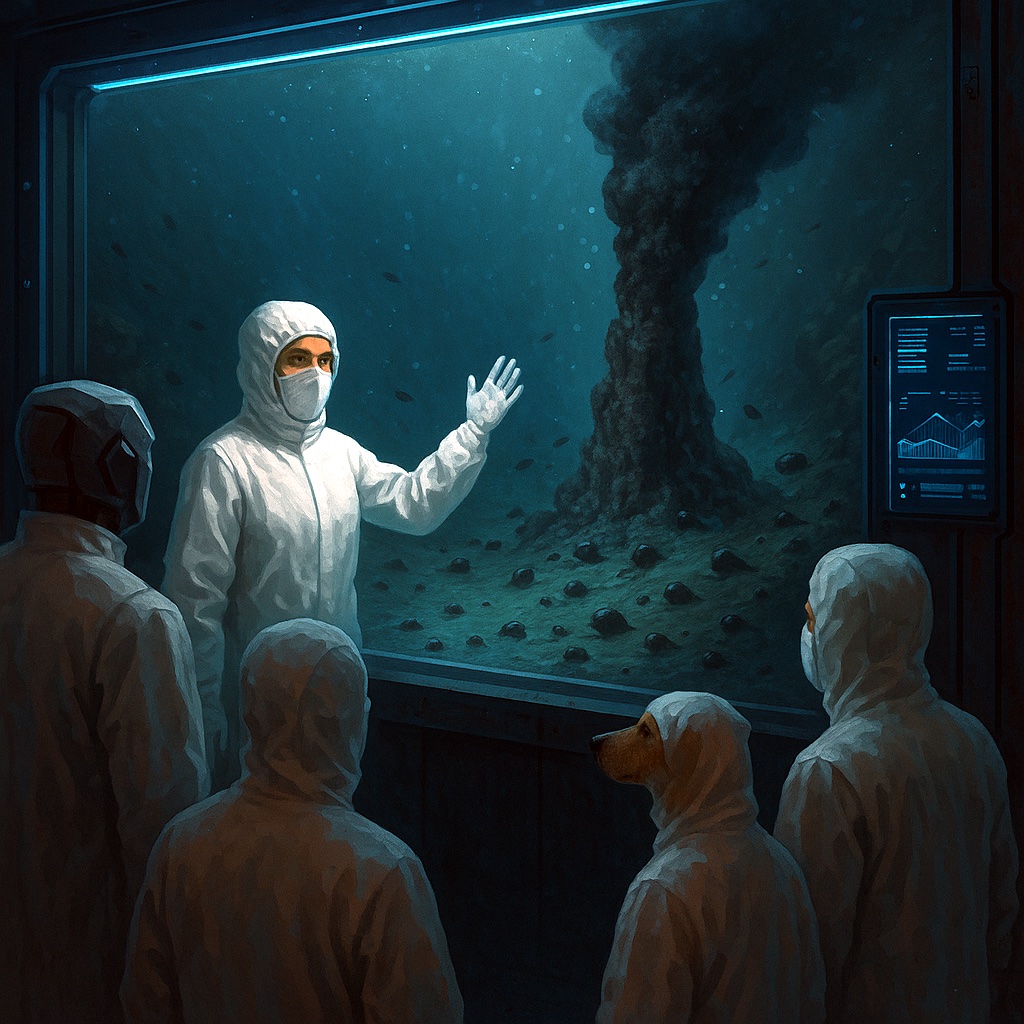Commercial DistrictDan and Argos drifted from Echo Park where they had lunched with Tamara. Afternoon sun lit the clean avenues of the city core. They walked side-by-side, Dan's eyes flickering from sleek facades to gliding delivery drones. Not another human voice or footprint anywhere. The first building they entered was a grocery market. Inside, the shelves were immaculately stocked. Real food glistened under ambient lighting—fruits, grains, and bottled liquids. But every label was illegible, reduced to Planet Language: streams of small QR codes, alien symbols punctuated by familiar numbers. Dan picked up a bottle. Argos watched. "The real food is here," Argos said. "Most elsewhere—plastic." Dan replaced the bottle carefully. Out on the street again, they wandered into a department store. It was a maze of clothing, tools, and gadgets—classy, advanced, high tech, new. Screens blinked gently to life when Dan passed. None spoke. Next came the toy store. It was less a place for children and more a playground for minds. Mechanical puzzles, levitating spheres, games written in Planet Language lined the shelves. In the center stood a cube—matte black, just large enough for a human head. Argos wagged his tail. "Take a deep breath," Argos said. "Look inside." Dan hesitated, then bent forward and plunged his head into the black. Nothingness. No air. His body—gone. Only his head floated in a vast vacuum far beyond the Milky Way. Dan couldn't breathe. Silence. His nose was getting colder. His irritated eyes couldn't take it any longer. Panic clawed at him. Dan yanked his head back, gasping for air. The toy store hummed around Dan, once again. Occasional beeping, as if nothing had happened. Argos said, "Don't get addicted." Deeper in the store, Dan found other surreal devices including a body-size two-sided perfect mirror placed into a heavy metal frame, including digital panel with buttons. Argos pawed the mirror. "The mirror is on. Walk through it" Dan walked through his own reflection. Left and right felt the same to Dan, but the room had changed. The room was still reflected. Everything in Dan's universe had swapped left and right parity. "This isn't possible!" said Dan. Argos laughed. "Walk through the mirror again," said Argos. Dan didn't hesitate. They moved on. Several specialty science and tech shops lined the boulevard—places brimming with molecular printers, photonic computers, gravitational manipulators. Dan marveled. Argos observed as if it were all ordinary. Yet most floors in most buildings were not shops at all. Elevators refused access beyond certain levels. Security panels flashed denial messages in Planet Language. Dan caught glimpses: endless banks of AI data centers humming behind glossy walls. Infrastructure for something vast and unseen. They reached the tallest nearby building. Up they went in a silent glass elevator, floor after floor blurring past. At the top, they stepped onto a skydeck. Dan leaned against the railing. The view was staggering. The green park spread out below. Beyond, glittering downtown towers. Giant terraces spiraled skyward. To the east, a ravine yawned open. A distant crater's rim gleamed under sun. To the north, a mountain range covered by immense glaciers loomed. "Fantastic," he said. Argos nodded. But everywhere—no voices. No humans. Dan adjusted a mounted telescope toward an airport. Cargo lifters rolled along the runways. "You have an airport," Dan remarked. "Cargo and defense," commented Argos. "This is a difficult time for the City." An elevator chimed behind them. Elevator doors opened. Tamara emerged, armored in a dark security uniform, automatic rifle slung over her shoulder. Her expression was grim. Tamara spoke quickly in Planet Language to both while Argos translated into English. "She says a threat is coming," Argos said. "We must leave. Now." Dan blinked. "What kind of threat?" Argos inquired. Tamara replied. "Terrorist!" Argos translated. Argos twisted his head. "Second elevator just engaged. It's coming up! Move!" Tamara exclaimed in Planet Language. Argos pushed Dan with his head and pulled Dan's arm by the elbow. Dan, Argos, and Tamara hustled back to the parked elevator which Tamara rode up on. They descended. Halfway down, a heavy vibration rocked the shaft. Something—massive, unseen—slammed against the building. When they reached the lobby, the group exited onto the street. Tamara unshouldered her weapon and began scanning the building's top. Dan also looked up. A giant, perfect black sphere—four meters in diameter, featureless and gleaming—suddenly lept from the roof and began hurtling down, like a large descending balloon, adjusting its trajectory, coming straight for them. "Run!" Tamara seemed to shout. Dan and Argos ran. Gunfire erupted behind them—Tamara firing at the black entity. Bullets sparked against its surface with no visible effect. Dan sprinted across the plaza, Argos racing ahead. They dove into an alley and kept running until the city street maze swallowed the sound. Back at Dan's apartment, doors locked and blinds drawn, Argos delivered a terse update. "Tamara reports that the terrorist escaped. We should stay inside." Dan sat heavily on the couch, breathing hard. Late that night, deep in silence, Dan and Argos were jolted awake by distant sounds. Gunfire. Explosions. Shouts. A rising, eerie mechanical howl—half roaring jet engine, half giant water drops splashing in a sink, emerged from the cacophany. Gloop, gloop, gloop. Dan tensed. Through the apartment's glass panels, Dan and Argos saw distant flashes—City SWAT units converging. A violent shootout mixed with echoed Planet Language shouts escalated and went on. Then the gunfire reduced. A final, sharp command sounded, which must have been the equivalent of "Cease fire!" in English. Silence again. Dan stared out into the night. The City, whatever it truly was, had taken care of its problem tonight. The CraterNext morning, Dan dreamt his wife Helen touched his shoulder and quietly said his name, "Dan". When Dan woke, he discovered it was only Argos' wet muzzle nudging him. Argos had their new day planned. Dan and Argos would visit The Crater. The gondola ride began in silence. Dan sat beside Argos as the small glass pod rose above the city's edge. Below them, the structured beauty of Tamara's Earth gave way to broken terraces and fractured land, where the megastructure crumbled into disrepair. Ahead, the crater rim emerged—irregular, collapsed in places, overgrown in others. Beyond it, yawned the vast scar of ancient catastrophe. "What is this place, really?" Dan asked. Argos, seated upright and still, replied, "An accident. A monument." They docked at a visitor station—silent, flower-choked, half-sunken. From here, paths wound through a garden of sculpted stone and memorials toward the crater's edge. Thirty kilometers wide, the basin stretched in silence, swallowing light and sound. In its center sat the relic of a massive radio telescope, like a collapsed coliseum. Its panels were shattered. The central antenna tilted like a mast on a broken ship. It looked fossilized. "The crater formed in seconds," Argos said. They joined a tour group: silent AI androids, glinting animal forms, and the occasional hovering drone. A deer-shaped AI greeted them. "Welcome," the deer said in Planet Language. Argos translated. "The tour begins shortly." Inside the remaining structure, hollow corridors stretched. Scuff marks and faded signage whispered of a past long buried. Holographic projectors came to life: ghostly animations of construction crews, data bursts, pulse-wave arrays, and the rising of the observatory from the crater floor. A Planet Language plaque hovered in midair. Argos translated it: Constructed: Year Unknown Dan lingered at a tall window. The view swept across the dish—cracked, moss-laced, overgrown. Metal struts curled like bones. The scale was dizzying. At midday, they dined on a terrace overlooking the crater. Dan ate quietly. AI birds chirped in the trees. One by one, six of them joined the picnic table, perching along its edge. They took up little space, mechanical feathers gleaming in the sun. "It is a rare honor to talk with a human," chirped one. A second tilted its head. "There is something strange about you. Are you a foreigner?" Dan raised his eyebrows. Argos turned to him. "They’re speaking UBCS—Universal Bird Chirp and Song. I’m translating." Dan nodded. "What did you say to them?" Argos replied evenly, "I told them yes." Dan smiled, just slightly. As twilight came, the group moved to the plaza. There, at the crater's edge, stood a granite fountain. In its center, a statue of a woman. One arm raised. Water streamed through her hair and robe, flowing endlessly into the basin. Tamara! Dan stopped. "It's Tamara!" Lights extinguished. Dan's eyes adjusted to the darkness. The stone statue had just turned to flesh. Tamara spoke. "Three thousand years ago, a New Physics confined experiment failed. A small release was predicted. What occurred was this." The sky behind her bloomed with simulation: the detonation, the rupture of space, fire blossoming into a crater. "Centuries later, mankind built a radio telescope in the planet's wound. We turned destruction into science and learning. Mankind listened to stars and galaxies." "The parabolic surface consisted of 16777216 computer-controlled moving triangular panels in the form of a geodesic dome. The feed cabin was suspended 8 km above the parabolic surface. The telescope observed primarily in the 1–10 GHz range around astronomy's well-known waterhole." She paused. The lights turned on again. The female statue had returned. Dan turned. Below, the radio telescope stirred. Red lights pulsed along its rim. The central mast adjusted. Machinery moved. Doorways lit. Systems engaged with a quiet hum. "It’s active!" Dan said. Argos stood. "It always does this at night." Dan looked at him. "How? Who is controlling it?" "We should go." Dan lingered, staring into the crater. The air vibrated faintly. The statue behind them stood still. The flame beside her burned blue. He followed Argos into the dark. As Dan and Argos' gondola pulled away in the night, behind them, the 30 km radio dish listened to the universe. The CryolabMorning came again. "Tamara will be at the Cryolab today," said Argos. The Cryolab stood on the edge of the City university grounds, a tall white structure without windows, decoration, or sound. Behind it, the campus gave way to parkland—trees, quiet walkways, no students. The buildings around it were silent. Dan and Argos arrived on foot from the apartment, cutting through the northern edge of the park. It was still bright out. The sun was high, the shadows short. Most of the City's AI citizens didn’t speak English or acknowledge Dan’s presence. Argos translated when necessary, and guided without ceremony. He’d already briefed Dan: the Cryolab was strict, cold, and quiet. They would see things worth remembering, but nothing would be explained unless asked. Argos had taken the tour before. At the entrance, a mechanical dispenser extended from a wall panel. It held a sealed pack. “Clean room clothing,” said Argos. Dan took the kit and stepped through the sterilization vapor without question. Inside: laminated coveralls, hood, mob cap, booties, dedicated flat shoes, a face veil, and powdered nitrile gloves. Every item was cold to the touch, free of dust, folded by machine. The inner scent was faint ethanol. Dan changed efficiently. He’d dressed for this—smooth undershirt, lab-ready slacks. No cotton, no fuzz, no seams. The scanner above the dressing station gave a silent green pulse. Argos wore nothing. His body was certified sterile, sealed, and waterproof. He stood quietly near the elevator. The lift brought them to the third floor. Tamara stood at the corridor’s end, already suited in full Cryolab garb—white, sealed, gloved, hood up. Her face veil was translucent. Only the shape of her profile gave her away. She spoke briefly in Planet Language. Argos translated: “Please join the group and have a seat. We’ll begin the tour in five minutes.” Dan followed Argos to a bench inside a waiting alcove. The other tour members—two bipedal AI, a hexapod with sensor limbs, and a quadruped with visible welding seams—stood silently. No conversation. The room was quiet except for low-frequency ventilation. Five minutes passed. Tamara returned and opened a sealed panel. They entered. The air temperature dropped as they passed through the clean threshold. Inside, the Cryolab’s experimental zones hovered just above freezing—dry cold, engineered for long-term precision. Lights buzzed at the edge of perception. No frost, no glare, no shadows. The tour group entered the Titan Life Lab. Behind hydrophobic double-pane glass, a wide basin of methane-ethane fluid spread under amber-filtered lights. Gentle waves moved across its surface in rhythmic intervals, each six millimeters high. Inside: black-pigmented single-cell organisms, suspended in slow drift. Their pigment allowed them to harvest light at wavelengths suited to Titan’s distant sun. No movement beyond fluid drift. No signs of distress. The environment had been tuned for them. Temperature: Cryogenically cold 90 Kelvin. Pressure and chemistry carefully controlled and monitored. Dan stood close to the glass. The interior was dry, flawless, unbreathing. This was not simulation. It was containment. The tour group proceeded to the Enceladus Aquarium. They entered a chamber marked with a glyph denoting sub-ice ocean simulation. Enceladus' ocean temperature was surprisingly not so cold—just a few degrees colder than the melting point of pure ice—despite Enceladus' incredibly cold 72K surface temperature. Beyond the viewing glass: a recreation of Enceladus’ deep ocean floor. Chimney structures pulsed slow clouds of nutrient-rich thermal matter from mineral vents. Light was minimal, just enough to track contours. Clustered around the chimneys were dozens of black snail-like organisms, none moving. They clung to the chimney like embedded fossils. Dan stood still. Even the vent output seemed indifferent to time. The tour group continued to the Cryonics Research Lab. This room buzzed softly—more activity, more life. Two walls were lined with transparent vitrification chambers, each sealed, labeled, and temperature-stabilized near −196 °C. Inside: rabbits, rodents, wood frogs, and other animals and organisms, either frozen in place or undergoing revival. At the center, a rabbit twitched faintly in its capsule, thawing in staggered pulses. Next to it, a frog remained locked in rigid posture, the ice clear around its limbs. Several pens held recovered animals—fur damp, limbs slow, breath visible. Rabbits sniffed corners. A frog shifted under a low lamp, its pulse trace displayed overhead. Workstations showed thermal gradients and cytoprotectant diffusion. Everywhere: clamps, sealed ports, surgical tubing, blinking monitors. Argos said quietly, “At high concentrations, cryoprotectants prevent ice formation. Vitrification—solidification without crystals.” Dan stepped closer to a chamber where a rodent’s heart trace had resumed. The animal was unconscious, but not dead. Tamara, near a monitor, spoke in a flat voice. Argos translated. “Scientists still have a lot to learn.” The tour's final room was the Extremophile Research Lab. A suspended observation tank contained goldfish-sized tardigrades, floating in slow lateral drift. Each flexed faintly, legs retracted, motion minimal. “Tardigrades descended from natural planet stock,” Tamara spoke, while Argos translated. “Bioengineered for size. Studied for extreme survivability.” A screen displayed freeze–thaw intervals. One of the creatures had endured 117 cycles. Another had survived extended desiccation followed by deep rehydration. Dan stared. The glass was impossibly clean. Argos translated Tamara's goodbye: “Our tour is over. I hope everyone has a safe trip home.” Tamara waved and disappeared through a silent access door. The tour group left by a corridor. Dan and Argos followed the corridor back through the buffer zone, returned their garments, and exited into evening air. Outside, the sun had sunk behind the lab towers. The plaza was still. The sky had turned dark steel blue, with no visible moon. Somewhere nearby, a deep vibrational hum began—steady and broad-spectrum, like a turbine idling far beneath the surface. Dan stopped. “That sound.” Argos paused beside him. “Could be lab cooling.” Something was moving out there. Dan and Argos stared into the blackness of the campus dusk. “Or not,” Dan said. Argos gulped. “Let’s jog,” Dan said. “Good idea,” said Argos. Dan and Argos ran, leaving the City University and Cryolab building behind. |
|
|
Tamara's World (Part 2)
|


